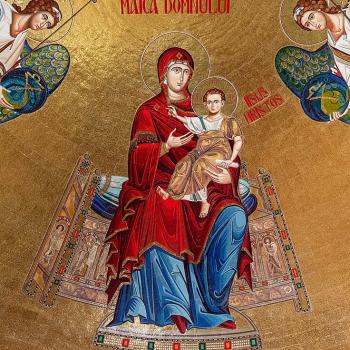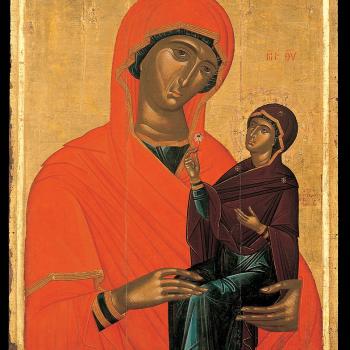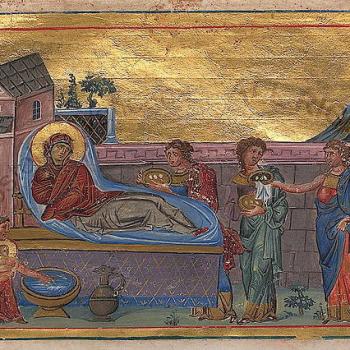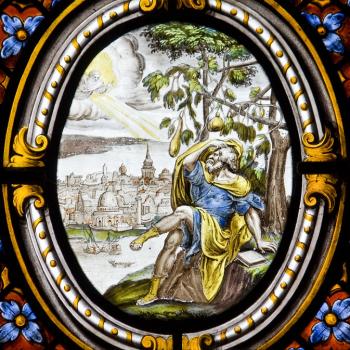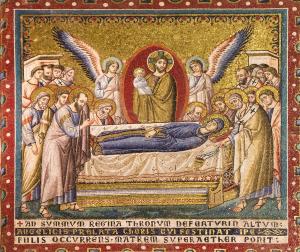
Today, we remember the entrance of the Mother of God into eternity. In the Byzantine tradition, this day is called the Dormition of the Mother of God, the day on which she went to “sleep.” It is important that we do not misunderstand what is meant with the word “dormition.” By saying Mary went to “sleep,” tradition is telling us that she died, using the euphemism which Paul used for death (one, which, to be sure, predated him, as there have been many who have associated sleep and death):
But we would not have you ignorant, brethren, concerning those who are asleep, that you may not grieve as others do who have no hope. For since we believe that Jesus died and rose again, even so, through Jesus, God will bring with him those who have fallen asleep. For this we declare to you by the word of the Lord, that we who are alive, who are left until the coming of the Lord, shall not precede those who have fallen asleep (1 Thes. 4:13-15 RSV).
While sleep is used as an euphemism for death, we can see how appropriate the term is because it suggests to us something about the nature of death itself: that, in some form or another, the person who dies continues to have some sort of personal consciousness which continues even after they have died; they find themselves in a different state of being, one which is more like a dream-state than it is like the ordinary form of consciousness. Just as our state of consciousness in a dream is inferior to the awakened form of consciousness, so one who is dead, so long as they remain among the dead, find themselves in an inferior state of being than that which they had while alive. This is why the resurrection is important, for it brings us out of the inferior state of death to the superior state of life, though in the resurrection, it will be a new modality of life, one which now transcends death and allows for glorification. Until then, those who are dead, those who are “asleep,” so long as they are “asleep,” find themselves still in existence, still having some form of life, as God, being the God of the living and not the dead (cf. Matt 22:32), preserves all who come to life even in death so that they shall not completely be annihilated.
Thus, the Dormition of Mary celebrates the day on which Mary died. She went to “sleep,” like all who die, but then, due to her connection with Christ, Christ took her “up” to himself so that she could and would find herself already participating in the resurrection from the dead (in anticipation of us, showing us that the resurrection truly is not just for Christ alone, but for all). That is, she was “assumed into heaven,” where she then finds herself no longer dead, but participating in the resurrection of her son, rendering her capable of looking over all of us, interceding for us with her great love.
This is the consistent teaching of the Christian tradition throughout the ages: Mary died, she was placed in a tomb, and then later (often said to be three days later), the apostles found her body was gone: they knew that she had been taken, not by anyone, but by Christ, which was confirmed by the way many came to know and experience her in her glorified form. There are some who try to say she did not die, thinking that why it is said she was assumed into heaven, but they misread and misunderstand the teaching, as it is all about how she partakes and participates in what Christ offers to all, though in a unique way because of her special relationship with Christ.
To be sure, the day is not just about Mary and her glorification; it is also about the continuation and fulfillment of the glorification of Christ’s own humanity, indeed, his own flesh (as his flesh came directly from her, and no one else). This makes the event a Christological event, and as a Christological event, we are reminded, however glorious Mary is (she is more honorable than the cherubim, and beyond compare more glorious than the Seraphim), she received her glory from Christ, and that glory is meant to point to and promote his greater glory. The Byzantine tradition, in its reading for the day, emphasizes this in the way it reads the words Jesus spoke to the woman who came to him to praise Mary:
As he said this, a woman in the crowd raised her voice and said to him, “Blessed is the womb that bore you, and the breasts that you sucked!” But he said, “Blessed rather are those who hear the word of God and keep it!” (Lk. 11:27-28 RSV).
Jesus did not deny Mary and her status, but he reminded the woman, and all others, that Mary’s status must be understood in relation to how she is the handmaiden of the Lord. She is humble and pure in spirit, and through that humility, she accepted the word of God and followed what God would have her do throughout all her life. When we honor her, we are honoring her because of how she aligned herself and her will to God’s will. And it is not just Mary we can and should honor, but anyone who does God’s will and keeps it. We can also find ourselves to be blessed if we accept the word and let it come to be borne in us so that we keep the word of God, aligning ourselves to it at every turn. That is, we are not to look directly at Mary and find ourselves stopping with her – we must always look to Christ, to whom she points. Mary is indeed blessed among women, but we can become blessed if we become like her and give birth to the word of God in our deeds. We are to do this in the same way Mary did, which is following Christ in humility, never seeking to glorify ourselves but rather, to empty ourselves of all such glory through loving service, so that we can then attain true glory in Christ:
Have this mind among yourselves, which was in Christ Jesus, who, though he was in the form of God, did not count equality with God a thing to be grasped, but emptied himself, taking the form of a servant, being born in the likeness of men. And being found in human form he humbled himself and became obedient unto death, even death on a cross. Therefore God has highly exalted him and bestowed on him the name which is above every name, that at the name of Jesus every knee should bow, in heaven and on earth and under the earth, and every tongue confess that Jesus Christ is Lord, to the glory of God the Father (Philip. 2:5-11 RSV).
Tradition tells us that she accepted her death as another indication of her humility, that she feared if she did not accept death, she would be seen by some as being greater than her son. She followed Christ with her own self-kenosis, never looking after herself and her glory, but always acting out of pure love for Christ her son. Thus, she is truly the handmaid of the Lord, the one who listened to and followed God’s word, giving birth to that word in her deeds; she found herself in so perfect a synergy with it, the Word became flesh and assumed human nature through her. Later, she died, and then was assumed her into heaven, showing us that in and through her humanity has been assumed by Christ. Let us follow her example, empty ourselves of all that would divide us from Christ, so that we can fill ourselves with his love, and through that love, find ourselves assumed by him and share with her, and all the elect, the glory if the kingdom of God.
Stay in touch! Like A Little Bit of Nothing on Facebook.
If you liked what you read, please consider sharing it with your friends and family!
N.B.: While I read comments to moderate them, I rarely respond to them. If I don’t respond to your comment directly, don’t assume I am unthankful for it. I appreciate it. But I want readers to feel free to ask questions, and hopefully, dialogue with each other. I have shared what I wanted to say, though some responses will get a brief reply by me, or, if I find it interesting and something I can engage fully, as the foundation for another post. I have had many posts inspired or improved upon thanks to my readers.




